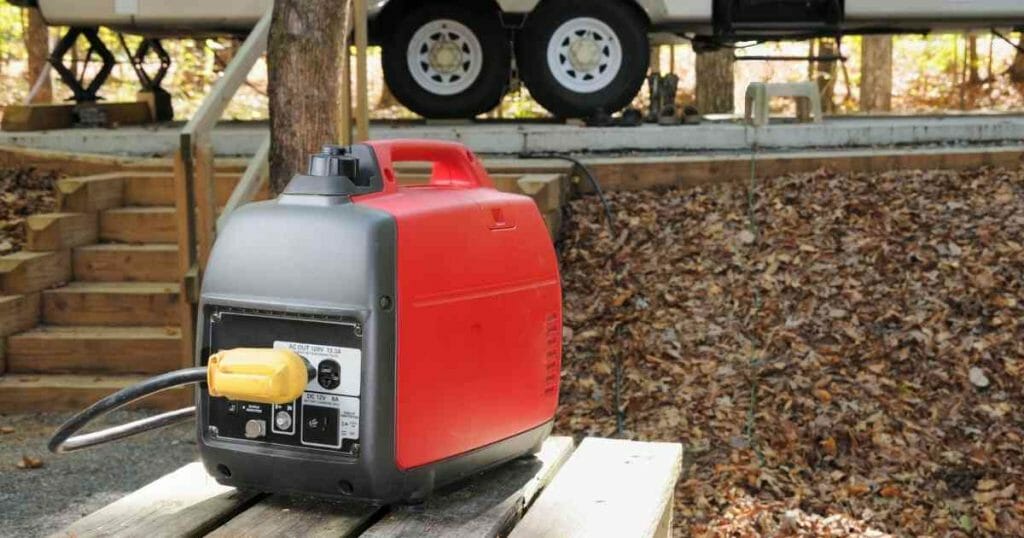This post contains affiliate links.
When wilderness camping or boondocking in your RV, having backup power is a necessity. Many people opt for a generator to help keep their refrigerator cold and recharge their house batteries.
Standard RV refrigerators consume between 100 to 800 watts per hour. A generator rated for 2000 or more continuous watts or running wattage should be suitable to operate an RV refrigerator with spare power for other essentials.
There are many other considerations to take into account when selecting a generator for your RV refrigerator. We cover all these topics in this article below.

Table of Contents
RV Refrigerator Power Consumption
Continuous watts or running wattage refer to the power consumption after the initial startup of your fridge. Therefore, it’s a key player in determining the generator size. Peak watts is the extra power required by your refrigerator during the start up phase. Your generator will need to handle both ratings.
Finding out your refrigerator power consumption is usually as easy as checking the owner’s manual or doing a quick internet search for your manufacturer and model number. The power requirements will be rated in watts (w), kilowatt hours kw/h.
If you can only find the current (A) and voltage (V) ratings, you will need to perform a simple calculation to find the power consumption of your unit.
How to Calculate the Power Requirement for Refrigerator
Calculating the power requirement for a refrigerator is not as complicated as you might think. Here are the steps below.
1. Calculate the Running Wattages
Read the energy label on the fridge to calculate the running wattages. The label shows the rated current, voltage, and voltage frequency.
Multiply the rated voltage and current to get the running wattage of your fridge. For example, a compact RV refrigerator that uses 120V at a rated current of 1.66A and has a running wattage of 200 watts.
2. Calculate the Starting Wattages
Next, find out the starting wattages in your fridge. This information is available on your refrigerator compressor label.
Check out the label that says Locked Rotor Amp or Full Load Amps. This figure is the current requirement for the compressor to turn on, and it’s always higher than the rated current.
Multiply this current value with the rated voltage. Depending on your type of refrigerator, these values can vary drastically.
As a rule of thumb, the peak value in a larger refrigerator will be much higher.
3. Calculate the Peak or Surge Wattage
After having all the running wattages, calculate the peak or surge wattage. Then you’ll need to consider the largest surge wattage value and multiply it by 1.25 for additional safety.
It’s also a good idea to use a wattage worksheet to plan your generator size and type of generator for your motorhome or RV trailer.
What Types of Generators are Available for RVs?
The types of generators vary according to certain features. These features generally include portability, fuel types, output connection styles and output power range.
RV ready generators have a few added options like a 30A RV outlet as well as 12V DC connections. Another added benefit is the dual fuel capability offered by innovative products like the Champion 4250 dual fuel generator which can run on gasoline or propane.
- ADVANCED DIGITAL HYBRID DESIGN: 50% quieter and 20% lighter than a traditional Champion 3500-watt generator, plus our Economy Mode feature...
- DUAL FUEL: This RV Ready inverter operates on gasoline or propane and has a 120V 30A RV, plus two 120V 20A household outlets and 12V DC...
- QUIET TECHNOLOGY: 64 dBA is great for RVs, tailgating, your next project or home backup, with 4250 starting watts and 3500 running watts for...
Inverter Generators
Inverter generators are fuel-efficient, quiet, and can provide up to 4000 Watts of power. All gas-powered generators are inverter generators. For more details, check out my recent article titled Do You Need An Inverter Generator For Your RV.
Solar and Wind Generators
Solar and Wind generators use wind turbines or solar panels to provide energy. Typically, they offer lower power than inverter generators and are most suited for stationary applications. Find out more in my Complete Step-By-Step Guide To RV Solar Installations.
Sizing A Generator to Run Multiple RV Appliances
Sizing your RV generator depends on the power consumption of your refrigerator and other appliances you plan to operate. However, if your generator can produce at least 2000 watts, it can power a refrigerator and some other small electrical loads.
Most portable generators can produce anywhere from 2000 to 6500 watts but a generator that is too small will keep tripping the circuit and shut down. This may cause damage to your appliances and your RV electrical system.
A larger generator is typically ideal but comes at a greater cost, fuel consumption and physical size and weight. If you plan to operate high current ac appliances like a blender, microwave or your air conditioning you’ll need to accept the added costs.
The best way to determine if a generator is large enough for your needs is to add up the wattage of each appliance you intend to use and add 25%.
What are Starting Wattages?
Appliances with motors (like water pumps and refrigerator compressors) need additional power during the first few seconds of starting up. Similarly, a furnace and air conditioner also consume more power during the initial startup. This is where a generator’s peak wattage rating is important.
Here is a quick summary to help you further:
- A small 400-watt fridge has a 1,200-watt starting wattage. For this, a 2000-watt generator will be suitable for the job.
- A standard 700-watt fridge can have a starting wattage of 2900 watts, which means you will need at least a 3000-watt peak rated generator.
- Side-by-side fridges have 1000 watts of running wattages with a 4000-watt starting wattage. In this case, you’d need a 4.5kw peak generator at a minimum.
Do Freezers and Refrigerators Have the Same Power Requirement?
Technically, freezers require more power because they maintain colder temperatures, so they need more energy. But a refrigerator may need more power if you use it a lot. So it depends on how the two machines are used in an RV.
For example, a refrigerator door is typically opened more frequently, so it must run the compressor more rigorously to compensate for the lost temperature.
Generally, the peak wattage in fridges is roughly three to five times the running watts. Interestingly, the position of freezers in refrigerators plays a crucial role in energy efficiency.
If you have a top-mount freezer, it will be more energy-efficient than the under-mount and side mount freezers. Moreover, your camping mini-fridges may not draw more than 50 running watts of power.
Once you know your freezer mount type, you can calculate your refrigerator wattages.
If you plan to add another electric appliance like an air conditioner, you must add all the running wattages to get a precise power requirement value.
FAQs
What Size Generator Do I Need to Power a 30 Amp RV?
A 3000 W generator can power most appliances, including the AC in a 30 Amp RV. Typically, a 30 Amp RV would have an air conditioning system of up to 13,500 BTU, and 3000 Watts are enough to power that.
However, a bigger generator would be even better as it can run not just the AC in the RV but also several other devices. While a 3000 Watts generator is the minimum, a 4500 Watts generator would be more than enough for a 30 Amp RV.
What Size Generator to Run the Biggest Fridge?
Typically, the highest power consumption for a refrigerator can be up to 1500 running watts. That would mean the starting wattage could reach a whopping 6000 watts.
In this case, you would need quite a large generator to extract maximum power. Generally, high-power generators can provide enough electricity to run an entire house.
Can a 2000 W Generator Run Both Refrigerator and Freezer in an RV?
A 2000 W generator can power a small refrigerator and freezer, along with some lights. However, you may not be able to power many appliances simultaneously. You will have to switch off the refrigerator or freezer to use another power-hungry appliance, especially those with higher starting wattage.
How Heavy is a 2000 Watts Generator?
A 2000 Watts generator can weigh 40 to 50 pounds. This is the generator’s weight without gas, so when you factor in the weight of the gas, it gets even heavier. The generator’s weight may vary by brand and model, but most 2k W generators are in the 40 to 50 pounds range.
Is It Safe to Run Appliances on RV Generator While Sleeping?
It’s safe to run an RV generator and power appliances while sleeping if the generator is outside and the doors and windows of the RV are shut. The potential hazard of running generators for a long time is carbon monoxide emissions or other hazardous fumes.
However, you can protect yourself from these fumes by closing the windows and doors of the RV and keeping the generator outside in the open air. Also, it’s worth it to invest in a carbon monoxide detector if you run your RV generator often while sleeping.
Bottom Line
Choosing the right generator size can be challenging since you have many models and types to consider. But you can quickly determine which generator size will suit your applications with a proper understanding of power usage.
So now that you know what size generator you need to run a refrigerator or freezer, you can enjoy better food quality and chilled drinks on your next camping trip.

